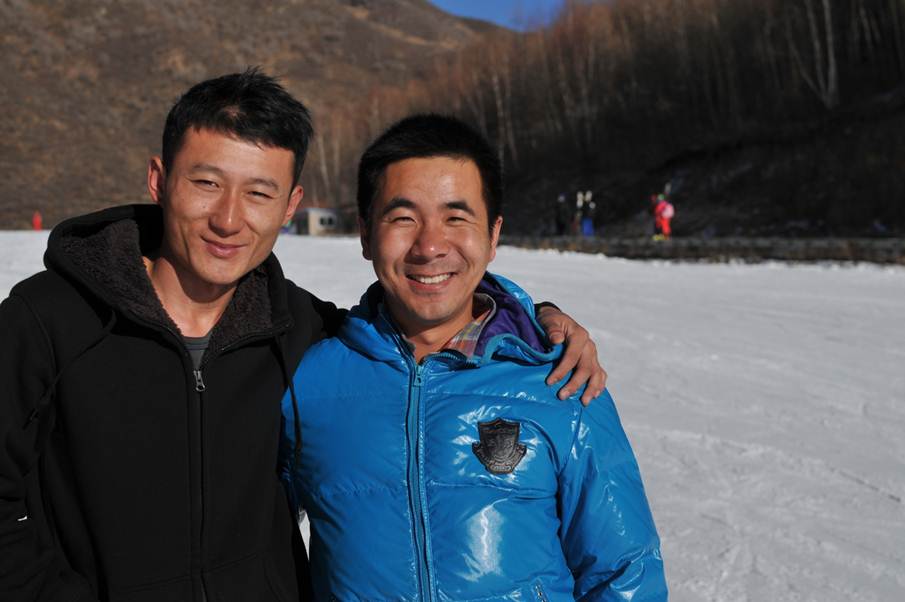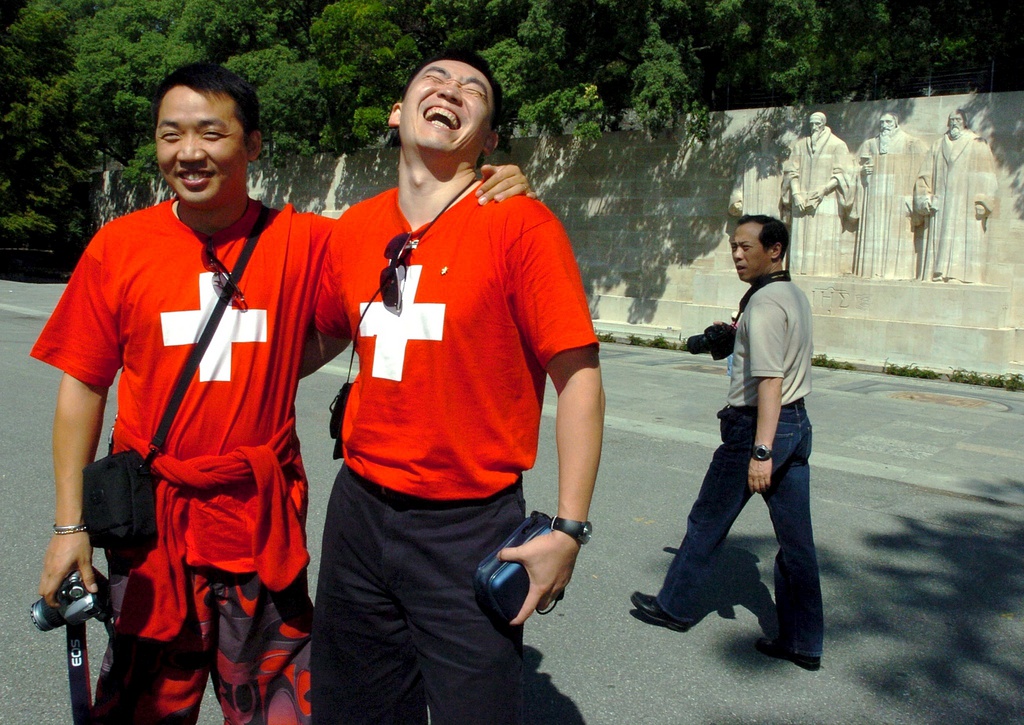From the ‘Davos of the East’ to the Swiss Alps

A group of Chinese ski instructors is being trained on Swiss ski slopes this winter. It’s an initiative by Switzerland Tourism, which wants to exploit the growing interest of the Chinese in winter tourism. swissinfo.ch met two of them ahead of their trip.
We meet over a Mongolian fondue in Xiwanzi, capital of Chongli County. We are 250 kilometres northwest of Beijing, in the Yin Mountains, a range which separates the great plain of northern China from the steppes of Mongolia. We are on the road used by Genghis Khan’s horsemen when they set out to conquer China.
Today Chongli advertises its ski resorts as the ‘Davos of the East’. Twenty-five-year-old Xu Zhongxing grew up here. He and his 23-year-old colleague Liu Jinyu, along with six other ski instructors, have been chosen to spend the winter in the Swiss Alps.
With a week to go before their departure to Switzerland, the two friends, who have never set foot outside their homeland, cannot disguise their curiosity. Should they bring a rice cooker? They have never eaten cheese fondue or raclette, but are happy to try it. “We will get used to the local food as quickly as possible,” says Liu.
Belated start
Liu’s ties to skiing are based solely on the geography of his birth. He grew up in the area of Yabuli, a town in northern Manchuria, in the Greater Khingan range – the skiing mecca in China. This is also where Club Mediterranean opened its first hotel in China in 2008 and where Liu became an instructor.
Xu, whose father is an engineer in the construction industry, has a younger sister. Liu is the son of market gardeners. His parents grow strawberries and grapes, and run a small nursery. Liu and his two younger sisters helped out with the work in the fields. The two families – like many others in rural China – have not stuck to the country’s one-child policy.
Fate may have raised Xu and Liu in ski resorts, but their respective families have hardly encouraged them to do winter sports. At the age of 15 and without his parents’ knowledge, Liu got on skis for the first time. His cousin gave him a pair of old skis, which he used to go down a hill near the family home.
‘A useless activity’
Although there is not much else to do in Yabuli in winter than have fun in the snow, in the eyes of his parents, skiing was a useless and costly waste of time. Nothing could replace study and academic aspirations. For two years, Liu trained in secret, and it’s only when he became an instructor at the age of 17 that his parents realised that it was possible to earn money through skiing.
Xu tried it for the first time when he was 21. When Chongli’s first ski resort opened in the 1990s, skiing was considered a luxury sport for wealthy idlers from Beijing who came to burn money at the weekend. Xu and his mates were happy to slide down the slopes on makeshift sledges.
Xu studied English for tourists in Qinhuangdao, a dreary industrial city on the Hebei plain. When people asked where he came from, he would describe Chongli as a city where you can ski, but realised he had never skied himself. Finally, in 2009, during the Chinese New Year holiday, he gave it a try.
Switzerland Tourism is inviting eight Chinese ski instructors to Switzerland from December 8, 2013, to March 31, 2014. They will be split up between eight resorts where they will undertake an internship in the respective ski schools. They will also participate in a week of special training in St Moritz.
The stations – Davos, Engelberg, Grindelwald, Gstaad, St Moritz, Verbier, Villars and Zermatt – were selected according to the number of Chinese tourists who visited during the winter season 2012/13.
Throughout the project, the instructors will feed a smartphone application designed for a Chinese audience with ski lessons and tips. Users can also look up the profiles of instructors and learn about the ski resorts.
The idea is first to familiarise the Chinese public with winter sports, says Batiste Pilet, head of Switzerland Tourism in China. There is growing interest, but also a lot of misconceptions. Second, it is a question of linking the idea of skiing with Switzerland as a tourist destination.
Over the next few years, Switzerland Tourism predicts that the number of overnight stays by Chinese winter tourists will increase by about 1,000 per year. It is not a good idea to have too sharp a jump, as expectations of Chinese customers are sometimes different and you have to give the resorts time to adapt, says Pilet.
Ski bug
After some rather inconclusive attempts on the beginners’ slopes, the future instructor took the chairlift and found himself at the top of the slope. A very challenging descent followed. He fell over countless times and the muscle aches lasted several days, but he had got the bug. In 2010, during the university holidays, he undertook intensive one-month training to become an instructor.
Liu, the student rebel, found his path quite naturally. His nightmare at school was English, a discipline whose usefulness he failed to grasp and which would be the main reason for his decision to leave school. It was only when he joined Club Mediterranean that he understood the importance of the language of Shakespeare and rushed to learn the communication basics. Just as the staff come from all over the world, so too does the clientele.
For Xu the choice was less obvious, because his university colleagues all entered public service. Even today, his parents still believe that there is no better career than that of civil servant. “I have my values and I intend to prove that you can succeed by following your own path,” he explains. “A government job, an apartment and a car is not the only honourable way.”
‘See the world’
Friends alerted Xu and Liu to the opportunity to go to Switzerland for the ski season. It offered the chance to realise a dream: to go skiing in the Alps, to spend a few months abroad and to see the world.
They jumped at the chance and were selected with six other colleagues, including one woman whom they quickly nicknamed Snow White.
Liu will spend the winter in St. Moritz; Xu in Grindelwald. They hope to visit each other during their spare time. Liu plans to take the Glacier Express; Xu expects to buy some watches and Swiss army knives.
But what they are most looking forward too, of course, is the skiing.
There are between five and ten million active skiers in China, says Switzerland Tourism. The number of resorts has exploded in recent years and new ones are being built. The main ones are in the region north of Beijing, Manchuria and in the Tien Shan range, in the autonomous region of Xinjiang.
Overall, the resorts are medium to low altitude. In Yabuli, the highest point is 1,374 meters. In Chongli county, Wanlong rises to 2,110 metres. North of Beijing, snowmaking equipment is widely used.
The ski areas are not yet extensive, and adjacent stations often do not have common passes so skiers rarely stay more than two days.
On the Wanlong slopes, the average level of skiers is relatively low in inverse proportion to the quality of the equipment such as the latest ski suits, walkie-talkies and helmets equipped with cameras. Only the best is good enough for Beijing’s wealthy young people.
The expectations of Chinese ski students differ from those of foreigners, says instructor Liu Jinyu. “They want to have a good time without getting hurt while Westerners want to make progress. Often instructors only teach the grandparents while other members of the family ski at their own pace.”
(Translated from French by Vincent Landon)

In compliance with the JTI standards
More: SWI swissinfo.ch certified by the Journalism Trust Initiative

You can find an overview of ongoing debates with our journalists here . Please join us!
If you want to start a conversation about a topic raised in this article or want to report factual errors, email us at english@swissinfo.ch.